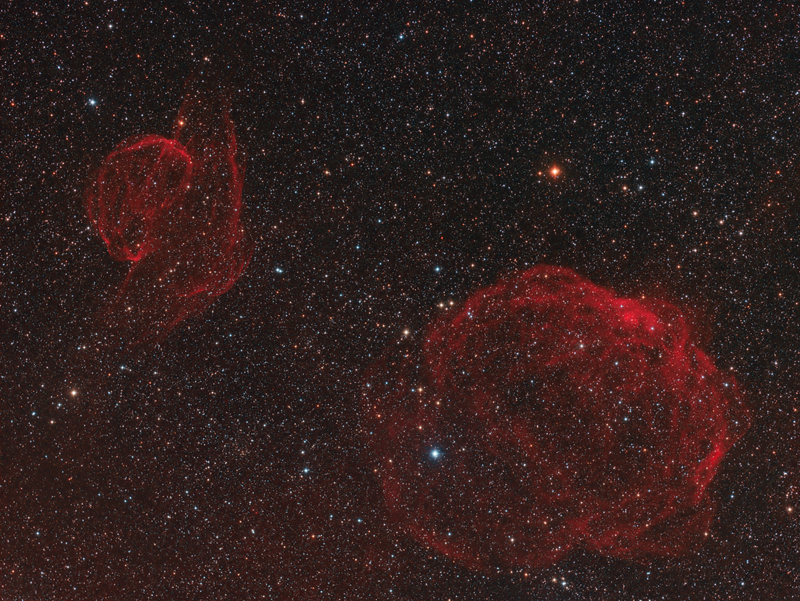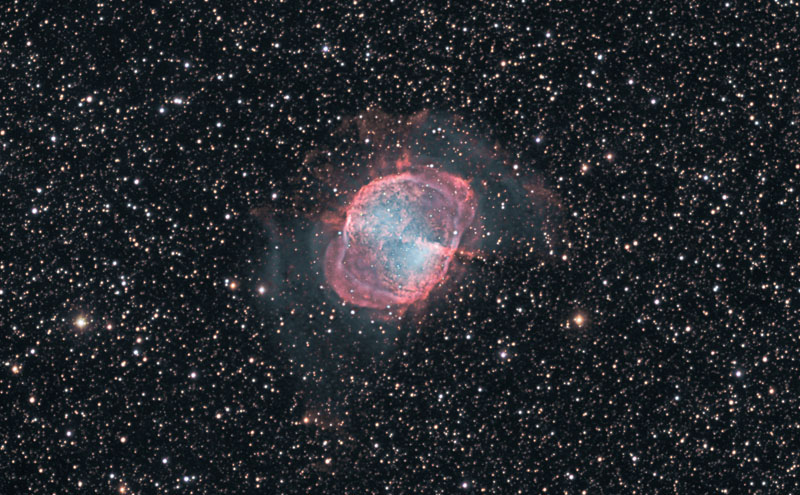Recent Submissions: 2012 July
Re: Recent Submissions: 2012 July
Ghost shark (LdN 1235, VdB 149, 150 in Cepheus)
http://www.pleiades.hu/en/index.php
Copyright: Lóránd Fényes
[attachment=0]ghostsharklorand.jpg[/attachment]
http://www.pleiades.hu/galeria/kozmosz2 ... mal/38.jpg
http://www.pleiades.hu/en/index.php
Copyright: Lóránd Fényes
[attachment=0]ghostsharklorand.jpg[/attachment]
http://www.pleiades.hu/galeria/kozmosz2 ... mal/38.jpg
Last edited by owlice on Sat Jul 28, 2012 12:31 am, edited 1 time in total.
Reason: Attached smaller image for faster downloading; left link to larger image. Thanks for sharing!
Reason: Attached smaller image for faster downloading; left link to larger image. Thanks for sharing!
- astrochuck
- Ensign
- Posts: 45
- Joined: Thu Jun 28, 2012 8:48 pm
- AKA: Chuck Manges
- Contact:
Re: Recent Submissions: 2012 July
M17 The Omega or Swan Nebula
[attachment=0]M17astrochuck.jpg[/attachment][/url]
http://farm8.staticflickr.com/7250/7646 ... 2bd7_b.jpg
M 17 The Swan,The Omega by astrochuck, on Flickr
Orion ED102T CF Triplet Apochromatic Refractor Telescope.
Orion Sirius German-equatorial Computerized Goto Mount
Images aquired using APT
Guided with Starshoot Autoguider and 50mm guide scope
Aligned and stacked with Nebulosity
Post-process with StarTools GIMP & Windows Live Photo
21 total frames: (2hrs 25min)
8x600 iso 800 Canon T3(modified) with Astronomik Ha clip-in filter w/Orion ST-80T
13x300 iso 800 Canon T3i no filters w/Orion ED 102mm
[attachment=0]M17astrochuck.jpg[/attachment][/url]
http://farm8.staticflickr.com/7250/7646 ... 2bd7_b.jpg
M 17 The Swan,The Omega by astrochuck, on Flickr
Orion ED102T CF Triplet Apochromatic Refractor Telescope.
Orion Sirius German-equatorial Computerized Goto Mount
Images aquired using APT
Guided with Starshoot Autoguider and 50mm guide scope
Aligned and stacked with Nebulosity
Post-process with StarTools GIMP & Windows Live Photo
21 total frames: (2hrs 25min)
8x600 iso 800 Canon T3(modified) with Astronomik Ha clip-in filter w/Orion ST-80T
13x300 iso 800 Canon T3i no filters w/Orion ED 102mm
Last edited by owlice on Sat Jul 28, 2012 5:51 am, edited 1 time in total.
Reason: Attached smaller image for faster downloading; left link to larger image. Thanks for sharing!
Reason: Attached smaller image for faster downloading; left link to larger image. Thanks for sharing!
Re: Recent Submissions: 2012 July
Waxing Gibbous Phase, July26, 2012
http://www.flickr.com/photos/vegastarca ... hotostream
Copyright : VegaStar Carpentier
http://www.flickr.com/photos/vegastarca ... hotostream
Copyright : VegaStar Carpentier
-
Gote Flodqvist
Re: Recent Submissions: 2012 July
Eta Carina from the Namibian desert. The darkest place on Earth?
http://user.tninet.se/~sdt522w/
Copyright: Gote Flodqvist, Sweden
http://user.tninet.se/~sdt522w/eta%20carina.jpg
http://user.tninet.se/~sdt522w/
Copyright: Gote Flodqvist, Sweden
http://user.tninet.se/~sdt522w/eta%20carina.jpg
Re: Recent Submissions: 2012 July
Cocoon Nebula
http://pocketrubbish.com
Copyright: Dan Watt http://www.pocketrubbish.com/ap/wp-cont ... Large2.jpg
http://pocketrubbish.com
Copyright: Dan Watt http://www.pocketrubbish.com/ap/wp-cont ... Large2.jpg
Re: Recent Submissions: 2012 July
Barnard's Galaxy Through a Veil of Galactic Cirrus
http://www.pbase.com/rolfolsen/astro_photography
Copyright: Rolf Wahl Olsen Link to 1600x1200 version (1.1MB): http://www.pbase.com/rolfolsen/image/145039519/original
Link to hi-res 75% size (2.2MB) http://www.pbase.com/rolfolsen/image/145039398/original
Image details:
Date: 17th, 18th, 19th, 26th and 27th July 2012
Exposure: LRGB: 470:114:112:112m, total 13hrs 28mins @ -30C
Telescope: 10" Serrurier Truss Newtonian f/5
Camera: QSI 683wsg with Lodestar guider
Filters: Astrodon LRGB E-Series Gen 2
Taken from my observatory in Auckland, New Zealand
This image shows a deep view of Barnard's Galaxy (NGC 6822), an irregular dwarf galaxy that is one of the nearest neighbours to our Milky Way. This galaxy was discovered by astronomer Edward E. Barnard in 1884 and is located about 1.6 million light years away in the constellation Sagittarius. Despite boasting a meagre 10 million stars, and extending only one tenth the size of our Milky Way, NGC 6822 contains a full menagerie of hot red star forming HII regions, planetary nebulae, bright OB associations and dark clouds.
In 1925 the famous astronomer Edwin Hubble published his paper 'N.G.C. 6822, A Remote Stellar System' which was a detailed survey of this galaxy. Apart from describing five of its brightest HII regions Hubble also discovered 11 Cehepid variables in NGC 6822. This was one of the most important discoveries in galactic astronomy and enabled NGC 6822 to be the first galaxy beyond the Magellanic Clouds to have its distance measured and in turn greatly expanded the size of the known Universe at the time.
NGC 6822 is a challenging galaxy to photograph since it has a very low surface brightness. But still many of its brightest stars are resolved together with the various star forming regions and blue OB associations.
Also visible throughout this image is a thin veil of galactic cirrus, or Integrated Flux Nebula (IFN). This is gas and dust which is not directly illuminated by stars but rather reflect the extremely faint combined glow of the Milky Way. With its appearance as thin wispy filaments, similar to high altitude fair weather clouds, these ghostly structures are known as galactic cirrus.
http://www.pbase.com/rolfolsen/astro_photography
Copyright: Rolf Wahl Olsen Link to 1600x1200 version (1.1MB): http://www.pbase.com/rolfolsen/image/145039519/original
Link to hi-res 75% size (2.2MB) http://www.pbase.com/rolfolsen/image/145039398/original
Image details:
Date: 17th, 18th, 19th, 26th and 27th July 2012
Exposure: LRGB: 470:114:112:112m, total 13hrs 28mins @ -30C
Telescope: 10" Serrurier Truss Newtonian f/5
Camera: QSI 683wsg with Lodestar guider
Filters: Astrodon LRGB E-Series Gen 2
Taken from my observatory in Auckland, New Zealand
This image shows a deep view of Barnard's Galaxy (NGC 6822), an irregular dwarf galaxy that is one of the nearest neighbours to our Milky Way. This galaxy was discovered by astronomer Edward E. Barnard in 1884 and is located about 1.6 million light years away in the constellation Sagittarius. Despite boasting a meagre 10 million stars, and extending only one tenth the size of our Milky Way, NGC 6822 contains a full menagerie of hot red star forming HII regions, planetary nebulae, bright OB associations and dark clouds.
In 1925 the famous astronomer Edwin Hubble published his paper 'N.G.C. 6822, A Remote Stellar System' which was a detailed survey of this galaxy. Apart from describing five of its brightest HII regions Hubble also discovered 11 Cehepid variables in NGC 6822. This was one of the most important discoveries in galactic astronomy and enabled NGC 6822 to be the first galaxy beyond the Magellanic Clouds to have its distance measured and in turn greatly expanded the size of the known Universe at the time.
NGC 6822 is a challenging galaxy to photograph since it has a very low surface brightness. But still many of its brightest stars are resolved together with the various star forming regions and blue OB associations.
Also visible throughout this image is a thin veil of galactic cirrus, or Integrated Flux Nebula (IFN). This is gas and dust which is not directly illuminated by stars but rather reflect the extremely faint combined glow of the Milky Way. With its appearance as thin wispy filaments, similar to high altitude fair weather clouds, these ghostly structures are known as galactic cirrus.
Huge Solar Eruption and M6-class flare on 2012/07/28
http://www.youtube.com/user/8cruncher8/videos
Source images: NASA SDO. Compositing by me. Link to full version 2085x1353 1.4MB: http://wkresse.de/2012_07_28__23_30_00_ ... _title.jpg
Link to actual video:
I created a video of yesterday's M6-class flare event and the huge coronal mass ejection happening shortly afterwards.
For the video, I used images provided by the NASA/SDO and the AIA science teams (3080 individual images).
This image, which is part of the video, is a composite of the of the AIA instrument's wavelength channels:
- red: 304 Å (prominences and chromosphere)
- green: 171 Å (mostly magnetic flux lines)
- blue: 335 Å (hotspots at 6.4 million kelvin, and corona)
Best regards,
Wolfram Kresse
Source images: NASA SDO. Compositing by me. Link to full version 2085x1353 1.4MB: http://wkresse.de/2012_07_28__23_30_00_ ... _title.jpg
Link to actual video:
Click to play embedded YouTube video.
For the video, I used images provided by the NASA/SDO and the AIA science teams (3080 individual images).
This image, which is part of the video, is a composite of the of the AIA instrument's wavelength channels:
- red: 304 Å (prominences and chromosphere)
- green: 171 Å (mostly magnetic flux lines)
- blue: 335 Å (hotspots at 6.4 million kelvin, and corona)
Best regards,
Wolfram Kresse
Re: Recent Submissions: 2012 July
Rho Ophiuchi
by Luca Moretti
http://www.astrobin.com/users/remidone/
[attachment=0]Rho_Luca.jpg[/attachment]
http://farm9.staticflickr.com/8143/7659 ... 5a68_h.jpg
by Luca Moretti
http://www.astrobin.com/users/remidone/
[attachment=0]Rho_Luca.jpg[/attachment]
http://farm9.staticflickr.com/8143/7659 ... 5a68_h.jpg
Last edited by owlice on Sun Jul 29, 2012 10:41 pm, edited 1 time in total.
Reason: Attached smaller image for faster downloading; left link to larger image. Thanks for sharing!
Reason: Attached smaller image for faster downloading; left link to larger image. Thanks for sharing!
Re: Recent Submissions: 2012 July
Located in the "Island in the Sky" district of the Canyonlands National Park, False Kiva is a Class II archeological site, meaning you will not find reliable directions to get there very easily, for a good reason  The hike is not easy. The trail is treacherous, steep and unforgiving at times leading along the edge of a very steep drop of several hundred feet...but worth every step.
The hike is not easy. The trail is treacherous, steep and unforgiving at times leading along the edge of a very steep drop of several hundred feet...but worth every step.
The giant window of the False Kiva is a stunning "room with a view" to rock formations under a celestial night sky in the Canyonlands. A hauntingly beautiful place lost in time where a silent echo of a culture that suddenly vanished!
http://500px.com/photo/10546819
The giant window of the False Kiva is a stunning "room with a view" to rock formations under a celestial night sky in the Canyonlands. A hauntingly beautiful place lost in time where a silent echo of a culture that suddenly vanished!
http://500px.com/photo/10546819
Last edited by bystander on Mon Jul 30, 2012 5:48 pm, edited 1 time in total.
Reason: added image from page link
Reason: added image from page link
-
nicola montecchiari
- Ensign
- Posts: 64
- Joined: Tue Sep 14, 2010 3:14 pm
- Location: Milano, Italy
- Contact:
Re: Recent Submissions: 2012 July
-
lynnhilborn
- Ensign
- Posts: 61
- Joined: Mon Dec 05, 2011 6:17 pm
- Location: Grafton, Ontario
- Contact:
An Energetic M27
An energetic M27...higher resolution and details
http://www.nightoverontario.com/Astrono ... &lb=1&s=X3
Thanks for looking
Cheers
lynn
http://www.nightoverontario.com/Astrono ... &lb=1&s=X3
Thanks for looking
Cheers
lynn
- mexhunter
- Science Officer
- Posts: 467
- Joined: Tue Apr 27, 2010 1:41 pm
- AKA: César Cantú
- Location: Monterrey, Mexico.
- Contact:
Re: Recent Submissions: 2012 July
I come to learn and to have fun.







